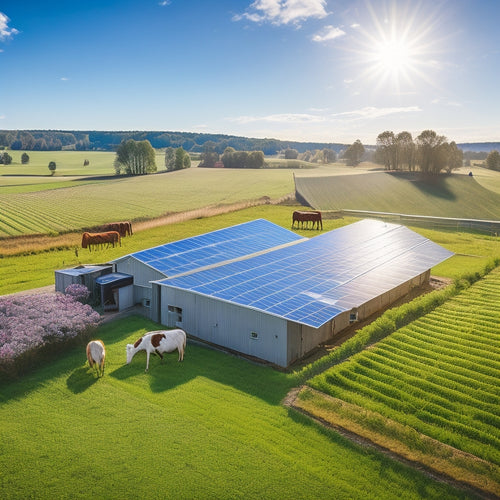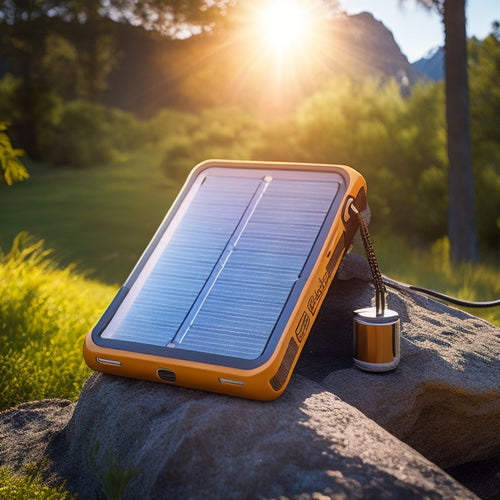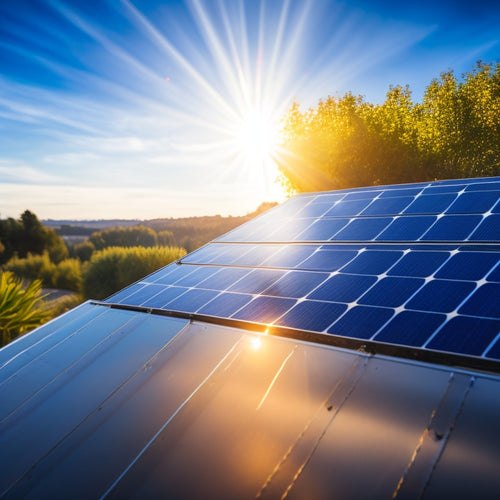
Essential Off Grid Solar Panel Kits for Independence
Share
Essential off-grid solar panel kits enable you to achieve true energy independence. By investing in these systems, you can utilize renewable energy, eliminate utility bills, and greatly reduce your carbon footprint. Understanding key components like solar panel types, inverters, and battery systems is vital for effective setup customized to your energy needs. With options to assess scalability and maximize your return on investment, these kits offer long-term savings while providing the ability to control your energy production. Investigate further to uncover the best practices for enhancing your energy autonomy and making the most out of your investment.
At a Glance
- Off-grid solar panel kits require an initial investment of $5,000 to $15,000, leading to long-term energy independence and savings.
- Understanding system components, including solar panel types and battery systems, is essential for effective off-grid setup.
- Effective budget planning and local government incentives can significantly reduce initial financial burdens and enhance savings.
- Off-grid solar systems allow for self-sufficiency, reducing reliance on traditional utilities and providing control over energy production.
- Accurate daily energy consumption calculations help size solar panels and ensure the system meets current and future energy needs.
Cost-Effective Energy Solution
When considering off-grid solar panel kits, it's essential to evaluate both the initial investment and the long-term savings they offer.
These systems provide energy independence, allowing users to generate clean energy without reliance on traditional utilities.
While the upfront costs may seem significant, the potential for reduced energy bills and independence from traditional utility rates can lead to substantial savings over time.
Investing in these systems not only pays off financially but also contributes to a sustainable energy future, promoting cost-effectiveness and energy savings.
Initial Investment Considerations
Investing in off-grid solar panel kits can initially seem intimidating, especially with costs averaging between $5,000 and $15,000, depending on your energy needs and system size.
However, this investment is a vital step towards achieving true independence from the traditional energy grid. When considering your options, thorough budget planning is important. You'll want to evaluate not just the upfront costs, but also how those align with your long-term energy goals.
Explore various financing options to ease the initial financial burden. Many companies offer payment plans, and some even have incentives or rebates that can greatly reduce your out-of-pocket expenses.
Long-Term Savings Potential
Utilizing solar energy offers significant long-term savings, making off-grid solar panel kits a cost-effective solution for your energy needs. By investing in these systems, you're not just purchasing equipment; you're securing your financial future.
With rising electricity costs, financial forecasting becomes essential. You can project how much you'll save over time, allowing you to budget effectively for your energy consumption.
When you utilize solar power, you reduce or eliminate monthly utility bills, providing immediate relief to your wallet. Over the lifespan of your solar panels—typically 25 years or more—these savings can amount to tens of thousands of dollars. This isn't just a temporary fix; it's a long-term strategy that guarantees you won't be at the mercy of fluctuating energy rates.
Moreover, proper budget planning around your solar investment allows you to allocate funds elsewhere, promoting greater financial independence. You'll also benefit from potential tax incentives and rebates, further enhancing your savings.
Embracing off-grid solar technology means you're not just investing in energy; you're investing in freedom from traditional energy constraints, enabling you to live life on your terms.
Sustainable Energy Source
When you choose off-grid solar panel kits, you're investing in a sustainable energy source that considerably reduces your carbon footprint.
These systems not only promote energy independence but also allow you to investigate innovations in solar technology that enhance energy output and efficiency.
Not only do these systems provide environmental benefits, but they also lead to considerable cost savings over time by minimizing reliance on traditional energy sources.
Environmental Benefits
As you consider off-grid solar panel kits, you'll find that they offer significant environmental benefits by utilizing renewable energy from the sun. By capturing this inexhaustible resource, you reduce reliance on fossil fuels and minimize your ecological impact. Unlike traditional energy sources, solar power doesn't emit harmful pollutants, helping to combat climate change and preserve our planet for future generations.
Here's a quick comparison of the benefits:
| Benefit | Description | Impact on Environment |
|---|---|---|
| Reduced Carbon Footprint | Solar panels produce energy without emissions. | Lowers greenhouse gases. |
| Sustainable Resource | Sunlight is abundant and renewable. | Guarantees long-term energy supply. |
| Minimal Land Disruption | Solar installations can be placed on rooftops. | Preserves natural habitats. |
| Low Water Usage | Solar energy requires minimal water to function. | Conserves essential water resources. |
Cost Savings
Investing in off-grid solar panel kits not only contributes to environmental sustainability but also offers considerable cost savings over time. By capturing the sun's energy, you can greatly reduce your reliance on traditional electricity sources, which often come with rising costs.
With effective budget planning, you can allocate your funds toward an initial investment that pays off in the long run.
The key to maximizing your savings lies in energy efficiency. Off-grid solar systems allow you to generate your own power, eliminating monthly utility bills and reducing your overall energy costs.
As energy prices continue to climb, having your own solar setup protects you from unpredictable rate hikes and provides a reliable energy source, no matter where you are.
Moreover, many local governments and organizations offer incentives, rebates, and tax credits for installing solar energy systems, further enhancing your savings.
With careful planning and the right equipment, you can achieve energy independence while keeping your finances in check.
Embracing off-grid solar technology isn't just a step toward sustainability; it's a smart financial move that paves the way for a more self-sufficient future.
Key Components Overview
To effectively utilize solar energy for off-grid living, you need to understand the key components: solar panel types, inverters, and battery systems. Each element plays a vital role in maximizing efficiency and ensuring a reliable power supply.
Selecting the right components involves evaluating energy needs and consumption to establish a baseline for your system. By choosing high-efficiency panels and appropriate battery storage, you can create a sustainable energy solution customized to your needs.
This process is essential for conducting efficiency evaluations that identify high energy usage areas.
Solar Panel Types
When exploring solar panel types, understanding the key components is vital for making informed decisions about your off-grid solar setup. You'll find various options, each with its unique benefits, catering to your freedom-seeking lifestyle.
| Panel Type | Efficiency | Cost |
|---|---|---|
| Monocrystalline Panels | 15-22% | Higher initial |
| Polycrystalline Panels | 13-16% | Moderate |
| Thin Film Technology | 10-12% | Lower initial |
| Bifacial Modules | 20-25% | Higher initial |
Monocrystalline panels are known for their high efficiency and space-saving design, making them ideal for limited areas. Polycrystalline panels, while slightly less efficient, often come at a lower cost, allowing for budget-friendly setups. Thin film technology offers lightweight panels that perform well in low-light conditions, though they generally have lower efficiency. Bifacial modules harness sunlight from both sides, maximizing energy production and providing excellent value over time.
Choosing the right type is vital for achieving energy independence. Assess your needs and space, and align them with the panel characteristics to gain the freedom you desire through sustainable energy.
Inverter and Battery Systems
In off-grid solar setups, understanding inverter and battery systems is fundamental for optimizing energy storage and management. These components are essential for utilizing the full potential of your solar energy and achieving true independence.
First, let's talk about inverter types. You've got two main categories: pure sine wave and modified sine wave inverters.
Pure sine wave inverters are ideal for sensitive electronics and guarantee a smooth, reliable power supply. On the other hand, modified sine wave inverters are more affordable and can work well for basic appliances. Choose wisely based on your power needs.
Next, battery technologies play a significant role in your energy independence.
Lithium-ion batteries are popular for their efficiency and longevity, while lead-acid batteries are more budget-friendly but require more maintenance. Assess your energy usage patterns and budget to determine the right battery for your system.
Selecting Based on Energy Needs
To effectively select an off-grid solar panel kit, you need to calculate your daily energy consumption accurately. This involves evaluating your consumption patterns and identifying high-energy appliances to target upgrades.
Understanding your energy needs will help you assess scalability options for your system, ensuring it can grow with your requirements. This approach guarantees you invest in a solution that meets both your current and future energy demands, while also allowing for efficient energy management to optimize your renewable energy usage.
Calculate Daily Energy Consumption
Calculating your daily energy consumption is essential for selecting the right off-grid solar panel kit. Start by listing all your devices and appliances, noting their wattage and average daily usage. This gives you a clear illustration of your energy usage.
Don't forget to take into account your consumption patterns—how much energy do you use during peak times versus off-peak?
To find your total energy consumption, multiply the wattage of each device by the number of hours you use it daily, then sum these figures. For instance, if you use a 100-watt bulb for 5 hours, that's 500 watt-hours per day.
Once you have your daily total, you can better gauge the size and number of solar panels needed to meet your energy needs. Aim for a system that can produce more energy than you consume, allowing for cloudy days and unexpected increases in usage.
By understanding your consumption patterns, you can choose a solar kit that not only meets your current needs but also provides the freedom to expand in the future.
Don't let energy constraints limit your independence; take charge of your energy future today!
Assess System Scalability Options
When choosing an off-grid solar panel kit, it's crucial to assess how scalable your system can be based on your current and future energy needs. By understanding the potential for system expansion, you'll guarantee that your investment accommodates growth as your energy requirements evolve.
Start by evaluating your baseline consumption and envision how your lifestyle might change. Are you planning to add new appliances, or perhaps expand your living space? A modular solar setup allows for future upgrades without the need for a complete overhaul.
Choose a system with flexible components, like expandable solar panels and batteries that can easily integrate additional units. This way, you can gradually enhance your capacity as your energy demands increase.
It's also important to take into account the inverter's capacity, as it dictates how much power you can draw simultaneously. Investing in a higher-rated inverter now can save you from costly replacements later.
Higher Energy Autonomy Potential
When you invest in off-grid solar panel kits, you're not just gaining a power source; you're enhancing your energy independence.
These systems enable you to generate and store your own electricity, reducing reliance on traditional utilities.
As a result, you can enjoy greater control over your energy consumption and costs, ensuring a more sustainable lifestyle.
Increased Energy Independence
With off-grid solar panel kits, you can greatly enhance your energy independence, allowing you to rely less on traditional power sources. By utilizing renewable sources like sunlight, you gain the ability to produce your own energy. This means you're not just consuming electricity; you're generating it, leading to a self-sustaining lifestyle.
Energy storage systems play an essential role in this setup. They allow you to store excess energy generated during sunny days for use during cloudy days or at night. This flexibility guarantees that you have power when you need it most, minimizing dependence on the grid and increasing your autonomy.
Moreover, with the right off-grid solar panel kit, you can tailor your energy production to your specific needs, whether you're powering a remote cabin, a tiny home, or just seeking to reduce your utility bills.
The freedom that comes with generating your own electricity is liberating, and it's an investment in a sustainable future.
Frequently Asked Questions
How Long Do Solar Panels Typically Last?
Solar panels typically last 25 to 30 years, but their lifespan can vary based on durability factors like materials, installation, and maintenance. Investing in high-quality panels guarantees you maximize your return on energy independence.
Can I Expand My Solar Panel System Later?
Yes, you can expand your solar panel system later. With proper system scalability, you can easily integrate future upgrades, ensuring your energy independence grows alongside your needs. Welcome flexibility and enhance your sustainable energy expedition!
Are Off-Grid Solar Kits Suitable for All Climates?
Coincidentally, off-grid solar kits adapt well across diverse climates. Their solar panel efficiency varies, but with the right adjustments, you can utilize sunlight effectively, ensuring your energy independence regardless of weather challenges. Welcome freedom!
What Maintenance Do Solar Panels Require?
Solar panels require regular cleaning to remove debris and guarantee efficiency. Inverter maintenance is essential too; check connections and settings periodically. With proper care, you'll maximize energy production and maintain your system's independence.
How Do I Monitor My Solar Energy Production?
Visualize your solar system as a heartbeat, pulsing energy into your life. You can monitor your solar energy production through solar monitoring tools, enabling precise energy tracking, ensuring you utilize every ray for ultimate freedom and independence.
Explore More
In the garden of energy independence, off-grid solar panel kits serve as the sunflowers, reaching for the light of sustainable power. By investing in these cost-effective solutions, you're not just planting seeds for your future; you're cultivating a self-sufficient ecosystem. As you choose the right components customized to your needs, you'll uncover the potential for higher energy autonomy, allowing your home to thrive in harmony with nature. Welcome this groundbreaking expedition and let your energy independence bloom.
Related Posts
-

What Do I Need to Know About Farm Solar Panels
When considering farm solar panels, you need to assess costs, benefits, and technical specifics. Initial investment c...
-

Fastest Solar Chargers for Emergency Power
When choosing the fastest solar chargers for emergency power, you need to focus on features like rapid charging capab...
-

How Efficient Are Thin Film Solar Cells
Thin film solar cells provide an innovative approach to energy generation, boasting efficiency rates generally betwee...


